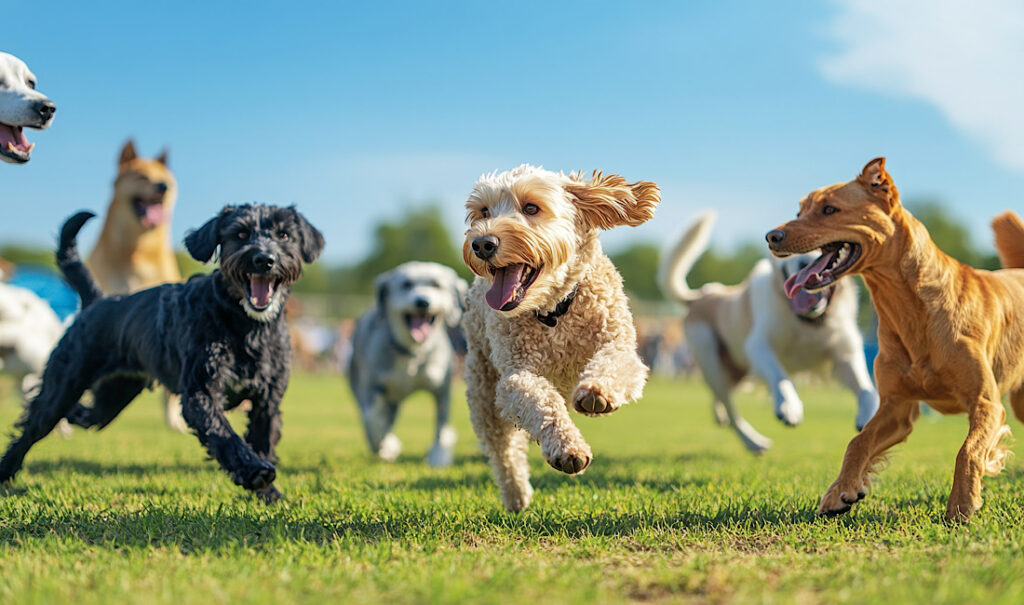
Socialization is essential for shaping a dog’s behavior, temperament, and overall confidence. While it is a lifelong process, the approach and challenges differ significantly between puppyhood and adulthood. Understanding these differences helps ensure dogs become well-adjusted companions.
Socialization in Puppies
The early stages of a dog’s life are critical for building positive associations with the world. This period offers a unique opportunity to establish the foundation for a confident adult dog.
The optimal socialization period occurs between 3 and 16 weeks of age. Puppies are highly receptive during this time, making it easier to expose them to new people, animals, and environments. This phase is crucial for reducing fear, fostering adaptability, and promoting trust.
Socializing puppies properly helps prevent behavioral problems such as anxiety, fear-based aggression, and excessive shyness. Exposing them to diverse stimuli in a safe, positive manner ensures they are comfortable with various situations as they grow.
Effective methods include puppy classes, which provide controlled environments for interaction with other puppies and people. Visits to dog-friendly parks introduce new sounds, sights, and smells, while controlled playdates with well-socialized dogs encourage positive behavior. Additionally, handling exercises familiarize puppies with being touched on their paws, ears, and mouth, preparing them for grooming and vet visits.
By rewarding puppies with treats, toys, or praise during socialization, they associate new experiences with positive outcomes, building their confidence.
Socialization in Adult Dogs
Socializing an adult dog can be more complex, especially if they missed out on socialization during puppyhood. Unlike puppies, adult dogs may have ingrained behaviors and preconceived responses to new stimuli, making them more cautious or reactive.
Challenges include fear, anxiety, or defensive behaviors like barking or growling in unfamiliar situations. Progress is often slower with adult dogs, requiring more patience and repetition to help them adapt.
Gradual exposure and positive reinforcement are essential. Desensitization involves introducing new stimuli at a tolerable level and gradually increasing intensity over time. Counter-conditioning replaces negative associations with positive ones by rewarding calm behavior in the presence of triggers. Structured reward-based training can also teach desired behaviors, such as staying calm in new environments.
Adult dogs with severe socialization issues may benefit from professional help. Certified trainers or behaviorists can create tailored plans to address specific concerns like aggression or extreme fear, ensuring a safe and effective approach.
Key Differences in Socialization
The techniques and outcomes of socialization differ between puppies and adult dogs due to their developmental stages and past experiences.
For puppies, socialization focuses on early exposure to people, animals, and settings to reduce fear and encourage curiosity. Methods like puppy classes and controlled playgroups promote positive experiences and prevent future behavioral issues.
For adult dogs, socialization aims to address existing fears and promote calmness through structured exposure and training. Techniques like desensitization and counter-conditioning help adult dogs adapt to new environments and situations.
Practical Tips for Successful Socialization
For puppies:
- Expose them to a variety of people, places, and objects in a safe, positive manner.
- Reward calm and curious behavior with treats, toys, and praise.
- Start socialization early to maximize their receptiveness to new experiences.
For adult dogs:
- Take gradual steps to introduce new stimuli without overwhelming them.
- Use reward-based training to reinforce positive behavior during exposure to unfamiliar environments.
- Work with a professional if needed to address severe fear or aggression.
Socialization is a lifelong process, and while puppyhood offers the most flexibility, adult dogs can also learn to navigate the world with confidence. With patience and the right approach, any dog can become a well-adjusted and happy member of the family.
Help your dog build confidence and adapt to the world at any stage of life! Contact The Wright Pet Daycamp & Boarding LLC about dog daycare where your furry friend can experience other dogs with professional supervision.



